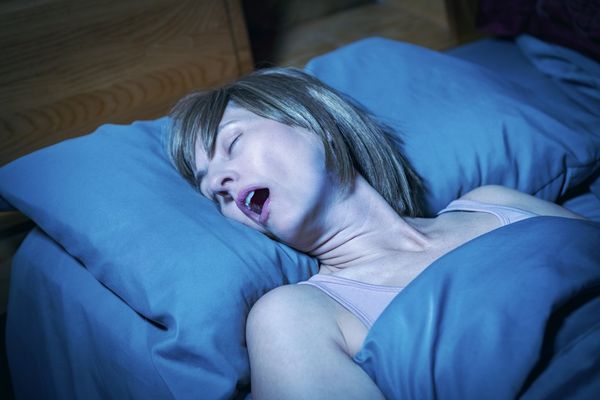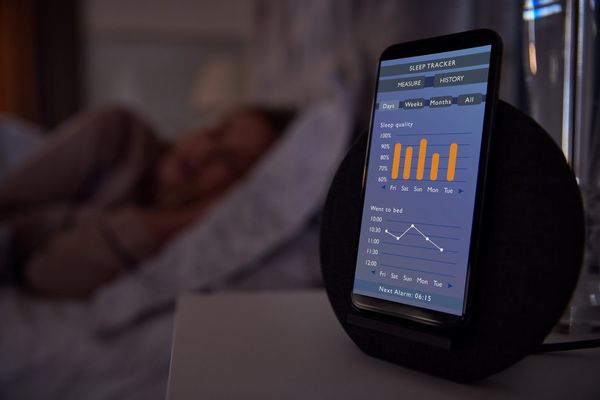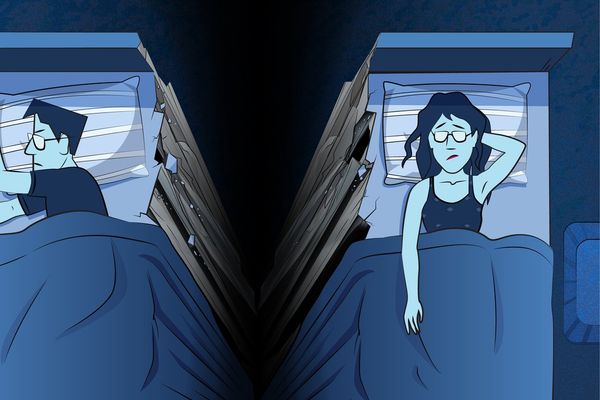Whenever Jordan Rosenfeld, 47, is short on sleep, her diet suffers.
“I reach for carbs and sugar the next day,” Rosenfeld said. “My go-tos are Fritos and Cinnamon Toast Crunch. Also, I don’t drink caffeine, so I really turn to these comfort foods for energy.”
Eating crummy food leaves Rosenfeld feeling equally crummy and can also cause bloating and slight weight gain.
“My pants definitely fit tighter after a couple days of not sleeping well,” she said.
Lack of sleep is an appetite stimulant
Rosenfeld’s experience is hardly mysterious: Sleep deprivation has been scientifically proven to contribute to an unhealthy boost in appetite the next day.
“Laboratory studies have shown that sleep loss stimulates appetite and increases cravings for high-calorie foods, therefore increasing the risk for weight gain,” said Dr. Esra Tasali, an associate professor of medicine and the director of the Sleep Disorders Center at the University of Chicago. “We have known this for a while.”
But now, thanks to a new study spearheaded by Tasali, we know that the reverse is also true: Getting enough quality sleep causes us to eat less than when we’re sleep deprived, thus increasing the likelihood of healthy weight loss.
Good sleep leads to consuming fewer calories

iStock.com/NemanjaMiscevic
The study featured 80 overweight adults who habitually sleep less than 6.5 hours a night (already below the recommended seven-plus hours) and found that when these people extended their sleep, they consumed an average of 270 fewer calories the following day.
“To increase the amount of time they slept, we did personalized sleep hygiene counseling sessions,” Tasali said. “We did two weeks of monitoring their usual sleep habits and then two weeks of extending their sleep in one group, while the other group continued to follow their habitual sleep routine.”
What happens in our bodies when we don’t sleep?
What exactly happens in our bodies and/or minds when we’re sleep deprived that causes our appetites to go haywire? And what happens when we get the recommended amount of sleep of seven or more hours? The study didn’t explore these more mechanical questions, but there is likely some interesting science going on behind the scenes.
“Sleep deprivation increases ghrelin, an appetite stimulating hormone secreted from the stomach,” Tasali said. “This hormone gives cues to eat more. When we are rested our body’s systems are better regulated and you feel less hungry.”
Tasali’s study is important not only for clinicians specializing in sleep but for those focused on obesity.
“The findings of this study draw a connection between sleep and one's weight,” said Dr. Holly F. Lofton, clinical associate professor of surgery and medicine and director of the medical weight management program at NYU Langone Health and member of HealthyWomen’s Women’s Health Advisory Council. “[They] suggest that improving and maintaining adequate sleep duration could reduce weight and be a viable intervention for obesity prevention.”
Why seven or more hours?
But why is it so important to get upwards of seven hours of sleep as opposed to, say, just 6.5 hours?
“The body does, essentially, a scan of the amount of fat cells one has after the seventh hour of sleep,” Lofton said. “If this amount of sleep is not achieved, then the body receives some confusing signals about what to do with appetite and also can receive hormonal messages to store fat. This can occur due to aberrations of the leptin hormone, which is secreted from fat cells and sends messages of either satiety or fullness.”
Struggling to get to a healthy weight? Give it a rest.
To be clear, this study doesn’t suggest that sleep is a replacement for food or that one should sleep their way through the day if they want to lose weight. Instead, it underlines the inextricable relationship between healthy sleeping and healthy eating and points to the possibility of a good night’s sleep as a weapon against obesity.
“Our study speaks to a new tool for society to tackle the obesity epidemic,” Tasali said. “Healthy sleep habits should be implemented in weight loss programs and weight maintenance programs because they can be a total game changer.”
At NYU Langone Health, where Lofton works, tackling sleep hygiene is already part of the fight against obesity.
“When we see someone for weight management, we talk at length about lifestyle, and that includes sleep patterns, sleep disorders, the hours they slept, and how rested they feel,” Lofton said. “Part of weight management is stress management — and that includes sleep hygiene.”
Lofton confirms that healthy sleep habits could indeed be a game changer in treating obesity, but it may not be a slam dunk in and of itself. Lofton pointed out that a caloric deficit of 270 calories could generate moderate weight loss — but meaningful long-term weight loss would likely only occur with increased exercise paired with a healthy diet. If patients are chronically gaining weight back after losing it, interventions such as medications and surgeries are the next steps in fighting obesity.
But the key takeaway from this study is that consistent, solid sleep is crucial to giving our body what it needs in order to self-regulate. This study should serve as a reminder that we mustn't skimp on sleep no matter how mighty the pressures to squeeze more hours into the day.
“Often, as women we sacrifice to a fault,” Lofton said. “My belief is: As caretakers — of families, of employees, of loved ones — we must not neglect ourselves. Prioritize your sleep and other self-care behaviors such as preparing and partaking in nutritious meals, physical activity and other stress management techniques.”
And there’s plenty of room for more research. Ideally, we would see a study that blends Tasali’s real-life findings with lab-based scientific evidence as to what exactly goes on in the body on a hormonal level. It would also be helpful to know how participants’ weights did or didn’t change after longer sleep and fewer calories consumed.
“More research can be done in perhaps a longer intervention study with more subjects,” Lofton said.







